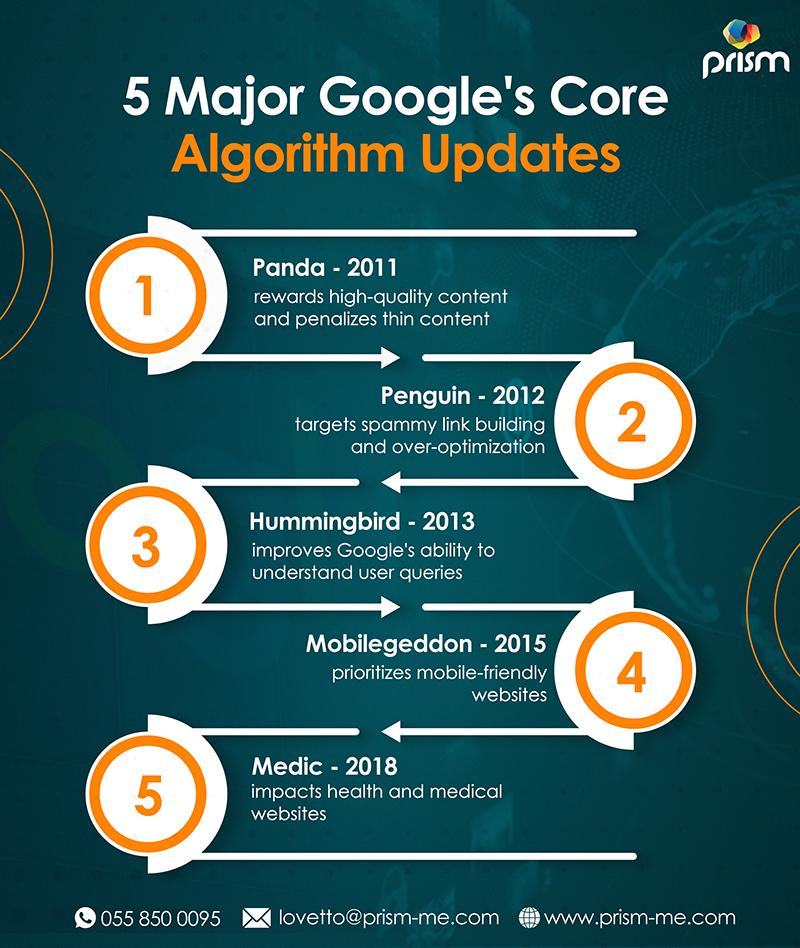Keep Ahead of the Curve: Search Engine Optimization Methods for Google's Algorithm Updates
Keep Ahead of the Curve: Search Engine Optimization Methods for Google's Algorithm Updates
Blog Article
Recognizing the Effects of Google's Formula Updates on Search Engine Optimization Strategies and Rankings
In the ever-evolving landscape of seo (SEARCH ENGINE OPTIMIZATION), the effects of Google's formula updates have actually ended up being a centerpiece for companies and marketing experts aiming to maintain or boost their on-line presence (Google’s Algorithm Updates). As Google proceeds to fine-tune its algorithms to offer users with the most top notch and appropriate search engine result, understanding how these updates influence search engine optimization positions and strategies is extremely important. From the refined changes in keyword techniques to the much more pronounced focus on individual experience, the interplay in between formula updates and search engine optimization practices introduces an intricate web of factors to consider that require constant alertness and flexibility
Advancement of Google's Formula

The Panda update, released in 2011, targeted low-quality content and punished sites with duplicate, slim, or pointless content. Penguin, launched a year later, resolved link spam by devaluing manipulative links. Hummingbird, presented in 2013, marked a change in the direction of semantic search, understanding the context and intent behind customer queries instead than just matching keywords.
These updates forced web site owners and search engine optimization professionals to focus on customer experience, quality material, and all-natural web link building techniques to boost their positions in Google's search results. The development of Google's formula emphasizes the online search engine's dedication to supplying valuable and appropriate web content to users while penalizing techniques aimed only at gaming the system.
Effect On Search Phrase Strategy
With the evolution of Google's algorithm towards prioritizing individual experience and material significance, the Effect on Search phrase Strategy has become increasingly important for web site owners and SEO experts seeking to align with these online search engine updates. Search phrases are no much longer practically matching search terms yet recognizing individual intent and providing important material. Google's updates, such as BERT and RankBrain, focus on all-natural language processing and context, making keyword approach extra advanced.

In Addition, with Google's emphasis on semantic search and user-focused content, keyword padding is no longer efficient and can also damage positions. Rather, integrating key phrases naturally into high-grade, pertinent web content is vital. By recognizing the influence of Google's algorithm updates on keyword phrase approach, website owners can enhance their SEO efforts and improve their visibility in search results page.
Changes in Content Optimization
As the landscape of search engine optimization continues to develop, website owners and SEO professionals are witnessing significant shifts in web content optimization approaches. Following Google's formula updates, there has actually been a growing emphasis on creating top quality, appropriate, and authoritative content that gives worth to individuals. This implies that just stuffing keywords right into posts is no much longer reliable; rather, web content has to be well-written, interesting, and customized to meet the needs have a peek at this website of the target market.
Additionally, there is a better emphasis on user experience and fulfillment, with search engines rewarding web sites that supply a seamless browsing experience and useful details. As a result, content optimization now entails not just incorporating appropriate key words naturally however additionally structuring web content in a way that is simple to browse and review.
Importance of User Experience
Enhancing individual experience on a web site is extremely important in modern-day SEO practices, working as an essential aspect in establishing a website's presence and success in internet search engine positions. Customer experience incorporates various elements such as site speed, mobile-friendliness, user-friendly navigation, and appealing material (Google’s Algorithm Updates). Google's algorithms progressively prioritize sites that provide a seamless and satisfying user experience, as it straight correlates with individual complete satisfaction and retention
A favorable individual experience not just boosts a site's SEO performance but additionally adds to higher conversion prices and client commitment. Web sites that site link are very easy to browse, visually appealing, and give beneficial web content are most likely to attract and retain visitors. On the other hand, web sites with poor customer experience metrics may experience high bounce rates and reduced dwell times, signifying to online search engine that the content might not be appealing or relevant for customers.
Consequently, purchasing optimizing customer experience is necessary for maintaining a competitive edge in the ever-evolving electronic landscape. By prioritizing user-centric design and functionality, web sites can improve their search engine positions and ultimately drive even more natural web traffic and conversions.
Strategies for Future Adaptation
Moving on in the swiftly developing landscape of SEO, it is vital for businesses to embrace cutting-edge techniques for future adjustment. One key method is to focus on producing high-quality, appropriate web content that provides worth to individuals. This web content should be enhanced for keywords that line up with individual intent and need to be frequently upgraded to remain competitive and existing.
Furthermore, services need to prioritize mobile optimization to accommodate the boosting variety of customers accessing the internet through smart phones. Making certain that websites load rapidly, are simple to browse, and supply a smooth individual experience on mobile phones can help improve search rankings and user complete satisfaction.
Moreover, leveraging information analytics and customer actions understandings can aid organizations understand their target audience better and tailor their SEO strategies accordingly. By keeping track of crucial performance signs and adjusting techniques based on data-driven understandings, organizations can remain in advance of the contour and adapt to the ever-changing SEO landscape. Embracing arising modern technologies, such as voice search optimization and fabricated knowledge, can likewise be useful for future-proofing SEO techniques.
Conclusion

With the development of Google's algorithm towards prioritizing customer experience and material relevance, the Influence on Keyword phrase Strategy has actually come to be increasingly important for site proprietors and SEO professionals looking for to line up with these search engine updates. Google’s Algorithm Updates. Key phrases look these up are no longer simply concerning matching search terms however comprehending customer intent and supplying useful content. Google's formulas significantly prioritize web sites that use a smooth and enjoyable customer experience, as it straight associates with customer satisfaction and retention
In contrast, websites with poor customer experience metrics may endure from high bounce prices and low dwell times, indicating to browse engines that the web content may not be interesting or appropriate for users.
The advancement of the algorithm has shifted emphasis towards customer experience and quality web content, impacting keyword approach and content optimization.
Report this page